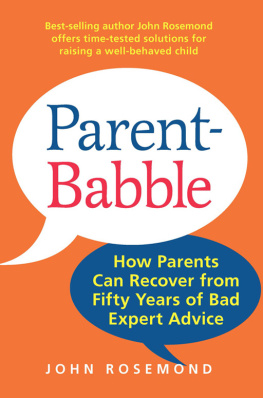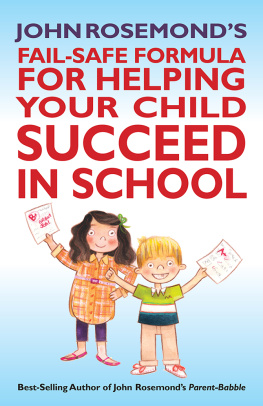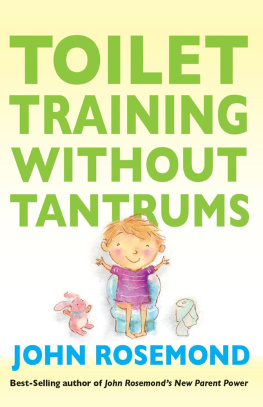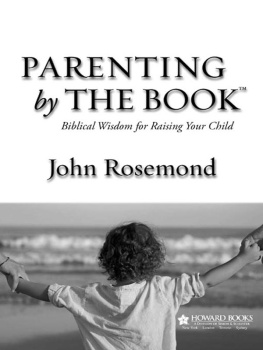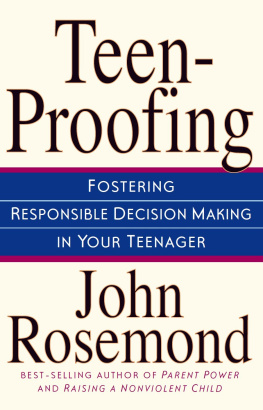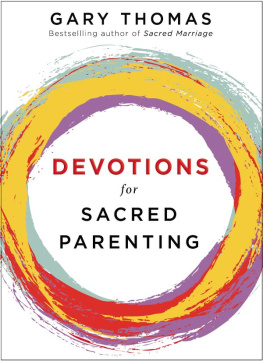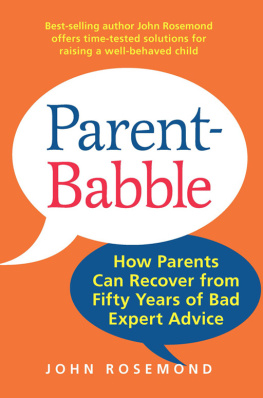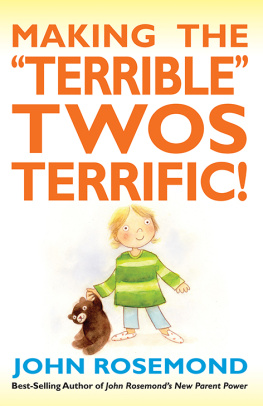
Other Books by John Rosemond
The NEW Six-Point Plan for Raising Happy, Healthy Children
The NEW Parent Power!
Ending the Homework Hassle
Making the Terrible Twos Terrific!
A Family of Value
Because I Said So!
Teen Proofing
To Spank or Not to Spank
Family-Building
Parenting by the Book
The Diseasing of Americas Children (with Dr. Bose Ravenel)
The Well-Behaved Child: Discipline That REALLY Works!

Acknowledgments
Special appreciation to Christine Schillig, my longtime editor at Andrews McMeel Publishing, for believing in my work and helping me become a better writer. Long may you run, Chris.
Many thanks to Kindred Howard, who did much of the research for, and wrote preliminary drafts of, several chapters.
Recognition to Dr. Michael Youssef, pastor and author of When All the Crosses Are Gone, for providing the inspiration for much of chapter one.
Gratitude to my good friend and colleague Dr. Don Jacobsen, for reading the first two chapters and cheering me on.
I sometimes think the world will either be saved by psychologists, in the broadest sense, or it will not be saved at all.
Abraham Maslow, humanistic psychologist (19081970)
There is nothing so absurd that some philosopher has not already said it.
Marcus Tillius Cicero (10643 BC)
Contents
One
Two
Three
Four
Five
Six
Seven
Eight
Nine
Introduction
I am a psychologist licensed by the North Carolina Psychology Board, but please dont jump to any conclusions, pro or con. Im a psychologist by license only. I dont really believe in psychologythe clinical form, that is. For one thing, I cannot find unbiased, compelling evidence to demonstrate that so-called talk therapyor any other form of psychological therapy, for that matterhas a reasonably high rate of effectiveness. In fact, Ive found significant evidence to the contrary, and as a result, I dont have much confidence in my own field of training.
As I have said many times, in many venues, including several previous books, I came to the conclusion some time ago that clinical psychology is a secular religionan ideology, in other wordsthat one accepts by faith. It has its doctrine (ever changing), patron saints (e.g., Freud, Skinner, Rogers), supposedly healing rituals, inquisitions for people like me who dare question its prevailing theories and practices, and excommunications. Psychology pretends to be science, when it actually consists of a set of often contradictory philosophical propositions concerning the nature of human beings. Despite the pretense of scientific, research-based underpinnings, the propositions in question are and always have been driven more by professional fad and consensus than solid, objective research. A personal story will illustrate the point.
In 1979, after submitting my qualifications and passing a rigorous exam, I obtained my license from the North Carolina Psychology Board and immediately went into private practice. By this time, I had been writing my syndicated newspaper column for three years. Over the next ten years or so, as I began to slowly realize that my profession was promoting parenting practices that were creating huge problems for parents, children, families, schools, and society, my column turned in a radical direction. I became more and more outspoken in my disagreements with my professions party line. As a consequence, my colleagues became more and more discomfited by what I was saying, the advice I was giving parents. After all, I was threatening their raison dtre, not to mention their standards of living.
In a column I wrote in the late 1980s, I had the temerity to tell two parents that if their young child had been seeing a therapist for six months because of behavior problems and the problems werent getting better and the therapist had yet to recommend any action to the parents, it was time to find another therapist. Reasonable advice, no? Not as far as my licensing board was concerned. They accused me of interfering in a therapistclient relationship. I plead guilty, but I would say that I was interfering in a relationship between an obviously irresponsible therapist and a gullible client. The board threatened to take my license away but ended up only reprimanding me and putting me on probation.
Several years later, I published another column in which, again responding to concerned parents, I said it was unlikely that a twenty-three-month-old child who had been sexually abused on one occasion by a stranger had formed a permanent memory of the incident. My exact words: In all likelihood, she has no memory of the event, nor will she ever have memory of it.
That was in 1991, when the popularity of so-called recovered memory therapy was peaking. Lots of mental health professionals had jumped on this very lucrative bandwagon. The premise behind this bogus therapy (brainwashing is a more apt term) was that nearly every emotional problem borne by adult womenirrational fears, anxieties, depression, sexual dysfunctions, you name itwas the result of repressed memories of childhood sexual abuse. The mental health community claimed that these memorieseven memories of sexual abuse that had occurred during infancycould be retrieved from the subconscious mind and dealt with under very unique, controlled therapeutic circumstances, led by a qualified professional (i.e., con artist).
Without any objective evidence, but simply because irresponsible (and, in my estimation, sociopathic) therapists encouraged insecure women to develop traumatic memories, scores of menfathers, uncles, brothers, longtime family friendswere unjustly accused of being sex abusers. In some cases the accusation was made decades after the supposed event. All over the country, hundreds if not thousands of innocent people had their reputations destroyed. Some even went to prison. Some committed suicide. Parentchild relationships were destroyed, in some cases irretrievably. And many families were permanently devastated. Meanwhile, a good number of therapists, including a good number of psychologists, were making a good amount of money specializing in this disgusting fraud. Hear me clearly: I am not saying that childhood sexual abuse does not occur; I am simply asserting that unbiased research available at the time did not support the idea that permanent memories, even of trauma, can form in the first two to three years of life. There may be rare exceptions, but that is the rule.
The column I wrote, giving reassuring advice to parents who were understandably upset, was threatening to the therapists in question, a number of whom occupied positions of power and prestige in the mental health establishment. A dozen or so newspapers, inundated with complaints, dropped my column, and several of these therapists complained to my licensing board. After a token investigation, the board accused me of violating professional ethics. This time, I had made statements that were not supported by a consensus of mental health professionals. Keep in mind that in the fifteenth century, a consensus of educated men in the sciences and religion believed the earth was the center of the universe. In fact, the Catholic Church was burning people at the stake for believing otherwise. In and of itself, consensus is not proof. It is simply proof that lots of people have faith that the proof will be found. In other words, a mere scientific consensus concerning any issue is insufficient and leaves the issue open to debate. Nonetheless, it was clear that my license and reputation hung in the balance.

